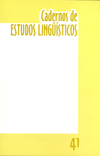Abstract
This papers deals with some models of explanation of the lexical semantics offered by recent linguistics and cognitive science. Our aim is to show the inadequacy of the digital computer model when it is confronted to some data. Furthermore, we try to indicate some new avenues for investigation: the dynamical systems hypothesis.References
ALTMANN, G. (1997). The Ascent of Babel: An Exploration of Language, Mind and Understanding. Oxford: Oxford University Press.
APOTHÉLOZ Denis. (1995). Rôle et Fonctionnement de L’anaphore dans la Dynamique textuelle. Genève: Librairie Droz. APOTHÉLOZ Denis. Nominalisation, réferents clandestins et anaphore atypiques. In: BERRENDONNNER, A e REICHLER-BÉGUELIN, M-J. (eds). (1995). Du syntagme ominal aux objets-de-discours. SN complexes, nominalisation, anaphores Neuchâtel: Institut de Linguistique de l’Université de Neuchâtel. p. 143-173.
APOTHÉLOZ Denis; REICHLER-BÉGUELIN, M-J. (1995). Construction de la référence et strategies de designation”. In: BERRENDONNNER, A. e REICHLER-BÉGUELIN, M-J. (eds). (1995). Du syntagme nominal aux objets-de-discours. SN complexes, nominalisation, anaphores Neuchâtel: Institut de Linguistique de l’Université de Neuchâtel. p. 227-271.
BERRENDONNNER, A. e REICHLER-BÉGUELIN, M-J. (eds). (1995). Du syntagme nominal aux objetsde-discours. SN complexes, nominalisation, anaphores Neuchâtel: Institut de Linguistique de l’Université de Neuchâtel.
BRESCIANI FILHO, E. & D'OTTAVIANO, I.M.L. (2001). Conceitos Básicos de Sistema Dinâmico Caótico. Campinas: (Mimeo)
CRUSE, A. (1988). Word Meaning and Encyclopedic Knowledge. In: HULLEN, W.; SCHULZE, R. (Eds.) (1988) Understanding the Lexicon: Meaning, Sense and World Knowledge in Lexical Semantics.
DUNBAR, G. (1994). The Cognitive Lexicon. Tübingen: Gunter Narr Verlag.
ELMAN, Jeffrey. (1990). Finding Structure in Time. Cognitive Science, 14, 179-211.
ELMAN, Jeffrey. (1993). Learning and Development in neural networks: The importance of starting small. Cognition, 48, 71-99.
ELMAN, Jeffrey. (1998a). Generalization, Simple Recurrent Networks and the emergence of structure. In M.A. Gernsbacher & S. Derry (Eds.)., Proceedings of the 20th Annual Conference of the Cognitive Science Society.Mahway, NJ: Lawrence Erlbaum
ELMAN, J. L. (1998b). Connectionism, artificial life, and dynamical systems: New approaches to old questions. In W. Bechtel and G. Graham (Eds.) A Companion to Cognitive Science. Oxford: Basil Blackwood.
ELMAN, Jeffrey et al. (1996). Rethinking Inateness: A connectionist perspective on development. Cambridge, MA: Bradford.
GARMAN, M.(1990). Psycholinguistics. Cambridge, UK: Cambridge University Press.
GEERAERTS, Dirk. (1988). Cognitive grammar and the History of Lexical Semantics. In: RUZDKA, B (ed), Topics in Cognitive Linguistics 647-677. Amsterdam: Benjamins. Amsterdam: Benjamins.
GEERAERTS, Dirk. (1998). Hundred Years of Lexical Semantics. In: Atas do 1º Encontro Internacional de lingüística Cognitiva. 123-154. Porto: Faculdade de Letras do Porto
GLEITMAN, L; LIBERMAN, M. (Eds.) (1995). An Invitation to Cognitive Science: Language. Cambridge, Mass: MIT Press.
HAIMAN, J. (1980). Dictionaries and Encyclopedias. In: Lingua 50, 329-357.
HULLEN, W.; SCHULZE, R. (Eds.) (1988). Understanding the Lexicon: Meaning, Sense and World Knowledge in Lexical Semantics.
KELSO, J. A. S. (1995). Dynamic Patterns. The Self Organization of Behavior. Cambrige (MA): Bradford Books.
KLEIBER, George (1990). La sémantique du Prototype. Paris: Seuil.
KLEIBER, George (1999). Probléme de Sémantique. La Polysémie em Question. Nancy: Setentrion.
KOCH, I.V.; MARCUSCHI, L.A (1998). Progressão Referencial na Língua Falada. Gramática do Português Falado. Vol. IX, no prelo.
KOCH, I.V.; MARCUSCHI, L.A (1998). Processos de referenciação na produção discursiva. Recife: mimeo.
MARCUSCHI, L. A. (1998). Aspectos da Progressão Textual na Fala e Escrita no Português Brasileiro. Recife: mimeo.
MARCUSCHI, L. A. (1999). A Questão Metodológica na Análise da Interação Verbal: Os aspectos quantitativos e qualitativos. Recife: mimeo.
MARSLEN-WILSON, W. (Ed.). (1989). Lexical Representation and Process. Cambridge, Mass: MIT Press.
MILLLER, G. (1978). Practical and Lexical Knowledge. In: ROSCH, E.; LLOYD, B. (1976). Cognition and Categorization. Hillsdale: Lawrence Erlbaun.
MOESCHLER, J.; REBOUL, A. (1994). Dictionnaire Encyclopédique de Pragmatique. Paris: Seuil.
MONDADA, L.; DUBOIS, D. (1995). Construction des objets de discours et categorisation: une approche des processus de référentiation. In: BERRENDONNNER, A. e REICHLER-BÉGUELIN, M-J. (eds). (1995). Du syntagme nominal aux objets-de-discours. SN complexes, nominalisation, anaphores Neuchâtel: Institut de Linguistique de l’Université de Neuchâtel. p. 273-302.
MONDADA, L. (1994). Verbalisation de l’Espace et Fabrication du Savoir. Approche linguistique de la construction des objets du discours. Lausanne: Université de Lausanne.
PINKER, Steven. (1994). The Language Instinct. London: Penguin Books.
PORT, Robert.; VAN GELDER, Timothy. (1995). Mind as Motion: Explorations in the Dynamics of Cognition pp. 1-577. The MIT Press, Cambridge (MA).
PUTNAM, H. (1995). Representación y Realidad. Un balance crítico del funcionalismo. Barcelona: Gedisa.
ROSCH, E.; LLOYD, B. (1976). Cognition and Categorization. Hillsdale: Lawrence Erlbaum.
THELEN, E.; SMITH, L.B. (1994). A Dynamic Systems Approach to the Development of Cognition and Action. Cambridge (MA): MIT Press.
The journal CADERNOS DE ESTUDOS LINGUÍSTICOS is granted all the copyright related to the published works. The originals will not be returned. By virtue of being part of this public access journal, the articles are free to use, with their own attributions, in educational and non-commercial applications

